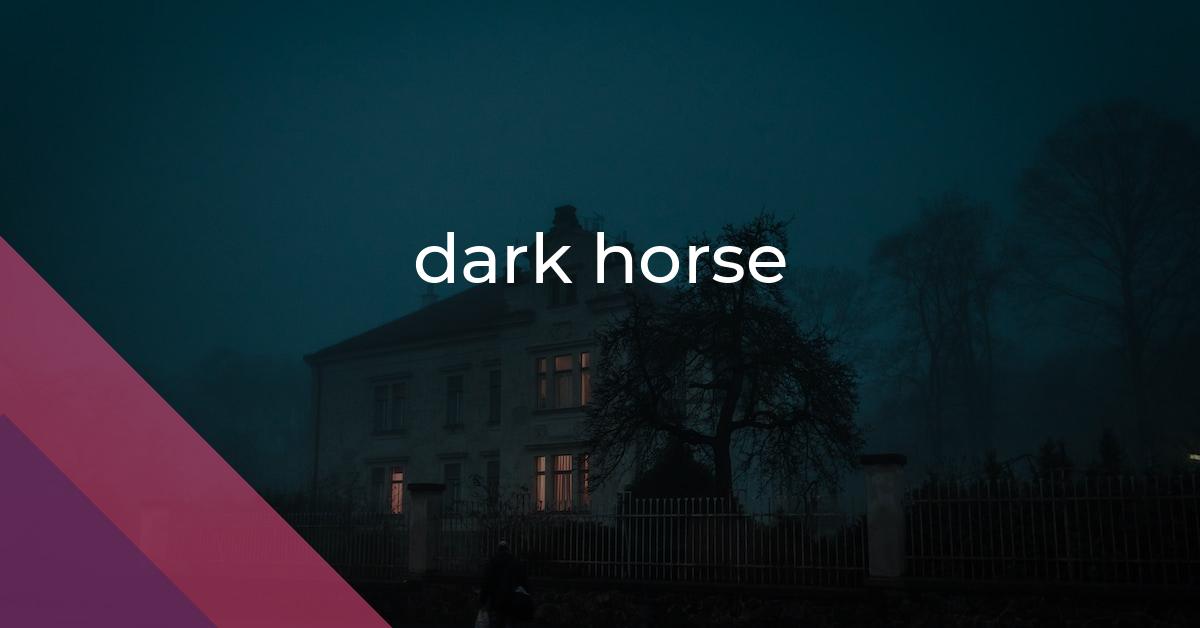dark horse: Idiom Meaning and Origin
What does ‘dark horse’ mean?
The idiom dark horse refers to a person or thing that is not well-known or expected to succeed, but may unexpectedly achieve great success or win a competition.

Idiom Explorer
An idiom meaning an individual or thing that is the most impressive or influential among others in a given field or situation.
The idiom "in the dark" means being unaware or uninformed about something, lacking knowledge or understanding. It is often used to describe a situation where someone is kept ignorant or intentionally left out of important information or events.
The idiom "hot shit" refers to someone or something that is highly impressive, successful or influential. It is used to convey a sense of superiority or remarkable qualities.
The idiom "horsetrade" means to bargain or negotiate, especially in a shrewd or calculating manner, in order to achieve a desired outcome. It is often used in the context of making deals or compromises, where both parties seek to gain an advantage.
The idiom "horses for courses" means that different people or things are suited to different tasks or situations.
The idiom "horse's ass" refers to someone who is foolish, incompetent, or makes a fool of themselves. It is often used to criticize someone's behavior or actions, implying that they are behaving stupidly or in a ridiculous manner.
The idiom "horse of a different color" refers to a situation or topic that is completely distinct or unrelated from the one previously mentioned or discussed. It implies a significant change or shift in focus, often catching people by surprise.
The idiom "hit the jackpot" means to achieve a great success or obtain an unexpected, significant gain, often in a financial sense.
The Enigmatic Contender
The idiom "dark horse" is used to describe a person or thing with hidden abilities or qualities that are not immediately apparent. It often comes up in the context of competition or elections, when someone unexpectedly succeeds or wins against the odds. This phrase has its roots in the world of horse racing, where a dark horse referred to a racehorse whose abilities were unknown or underestimated.
In horse racing, the term "dark horse" originated in the 1830s. It comes from the practice of not revealing a racehorse's true abilities or form to the betting public. Before a race, bookmakers would publish a list of the horses and their odds of winning. The more well-known or favored horses received attention from the bookmakers, while the lesser-known or underestimated ones, or the "dark horses," were often overlooked.
The idiom "dark horse" captures the idea that these horses wouldn't showcase their full potential until the actual race, surprising both the spectators and the bookmakers. Eventually, this term expanded beyond horse racing and became a common phrase in the English language. Today, it applies to any person or thing that achieves unexpected success or proves to be better than anticipated.
One related idiom is "horse of a different color." This phrase is used to describe something that is distinctly different or unrelated to what was previously discussed. It's similar to a dark horse in that it represents an unexpected or surprising element. For example, if someone was discussing a challenging project and suddenly mentioned a completely unrelated idea that could potentially solve the problem, you could say, "Well, that's a horse of a different color!"
Another related idiom is "black rider." This phrase is often used to refer to someone dangerous or ominous. It can represent an unknown or mysterious threat, similar to a dark horse that unexpectedly becomes a formidable competitor. For instance, if a business has been steadily growing but suddenly faces intense competition from a new, unknown player, you might say, "Watch out for that black rider in the industry!"
When it comes to competition, a front runner is someone who is initially considered the most likely to win. This is the opposite of a dark horse, who is often underestimated or overlooked. If a favorite candidate, team, or product ends up losing to a lesser-known competitor, you could say, "The dark horse unexpectedly surpassed the front runner to claim victory!"
Lastly, there's the saying "go horribly right." This phrase is used to describe a situation where something unexpected and seemingly negative actually turns out to be a success. It highlights the unpredictability of outcomes, which is also a characteristic of a dark horse. For example, if a project encounters numerous setbacks but ends up flourishing beyond expectations, you might say, "It didn't go as planned, but it went horribly right!"
The concept of the dark horse originated from horse racing but has expanded to become a widely used phrase across various fields. It serves as a metaphorical reminder that hidden qualities and talents can lead to unexpected success. Whether it's in politics, sports, business, or any other competitive domain, the allure of the unknown and the potential for surprising achievements continue to make the idea of the dark horse intriguing and captivating.
Example usage
Examples of how the idiom *dark horse* can be used in a sentence:
1. Despite being relatively unknown, the new candidate turned out to be a dark horse in the election, surprising everyone with their strong performance.
2. The underdog team, which was considered a dark horse in the tournament, managed to beat all odds and make it to the finals.
3. The talented singer was a dark horse in the competition. No one expected her to have such a powerful voice.
More "Metaphorical" idioms



